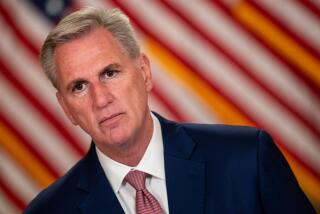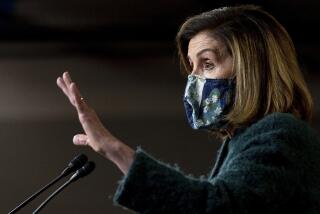It’s the Stimulus, Stupid
- Share via
George W. Bush has the right idea in calling for an economic stimulus. But his proposed package of $60 billion to $75 billion spends too little money and in the wrong places.
The economy was tottering before Sept. 11. Unemployment had taken a big jump, to 4.9%. The stock market was already in bear territory and not just because of the bust in dot-com stocks. Corporate earnings have been down across the economy.
The stock bubble of the late 1990s was a classic case of frenzy feeding on itself. Before it was over, investors had put trillions of dollars into enterprises that will never pay back a nickel.
The market excess itself had been a source of economic stimulus because it led to a lot of (unneeded) production and hiring. Now that this whole cycle is unwinding, the economy is unwinding with it.
All of this was well underway before the terrorist attacks, which have devastated several key sectors.
Most economists now forecast a moderate to severe recession. The Federal Reserve has just ordered yet another rate cut, putting interest rates at their lowest level since the Kennedy administration.
However, in an economy like this one, there are limits to what rate cuts--and tax cuts--can do. Rate cuts can work nicely to fine-tune economic growth. But when the problem is a loss of confidence or a severe downturn, they don’t do much. They were nearly powerless in the Great Depression, as they are today in Japan where rates are near zero.
If anxious consumers doubt that this is the time for big outlays, a slightly cheaper loan won’t help.
If entrepreneurs see nobody buying the product, they will not undertake a major expansion, no matter how attractive the financing.
Tax cuts, by the same token, also have their limits. Particularly useless are the kinds Republican legislators are promoting--cuts in capital gains and corporate income taxes, as well as rate cuts for high-income individuals.
Even tax cuts for ordinary consumers have their limits at a time when consumers are traumatized and disinclined to spend.
That leaves public outlay--and we surely need it.
We need spending not just for anti-terrorist purposes at home and overseas but to rebuild a variety of public systems, from Amtrak to zoological research on biowarfare.
So far, Bush’s approach is short on specifics other than calling for an additional $60 billion in tax cuts. Treasury Secretary Paul O’Neill also has said the administration’s first choice would be to accelerate the timing of the $1.35 trillion in tax cuts scheduled to take place later this decade.
Most of these tax cuts don’t benefit ordinary people. They are mainly rate cuts for the upper brackets and cuts in estate taxes that only 2% of Americans pay. Nearly all of the benefits go to the wealthiest 10%.
Instead of accelerating those cuts, we should repeal them. The money the Treasury saves could then be used for rebuilding, relief and rebates for ordinary people.
And rather than a stimulus of $75 billion, we need something like 2% of gross domestic product: $200 billion now and $100 billion more next year.
We should extend unemployment benefits and add money to the new post-welfare system of Temporary Assistance for Needy Families. We should put serious money into rebuilding not just airport security and intelligence but also our public schools and public health.
During World War II, we spent nearly half of the GDP on making war. The economy grew at the fastest rate in our history. During the peak of the Cold War, defense spending was more than triple its current share of GDP. Public outlay can be a terrific source of economic stimulus--and it needn’t all go for war-making.
We need all the stimulus we can get. President Bush has acknowledged the problem. Now it’s up to Congress to get the scale and the priorities right.
More to Read
Inside the business of entertainment
The Wide Shot brings you news, analysis and insights on everything from streaming wars to production — and what it all means for the future.
You may occasionally receive promotional content from the Los Angeles Times.










